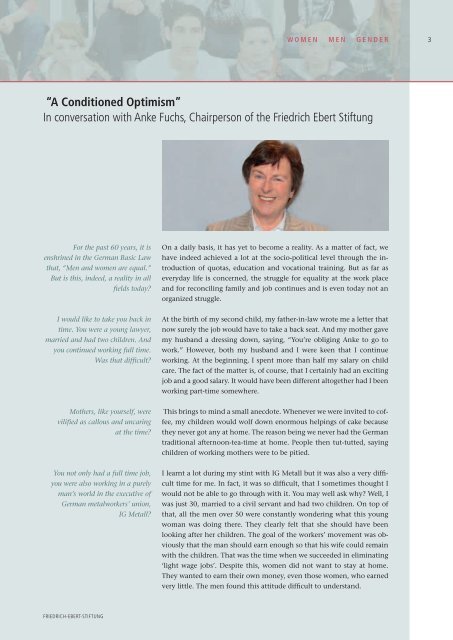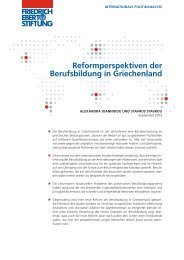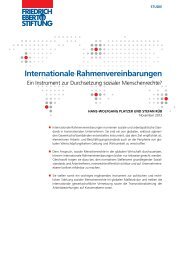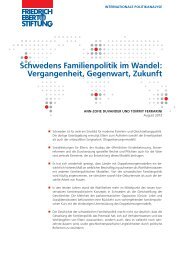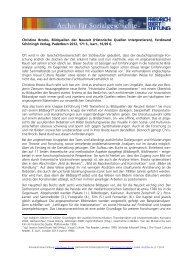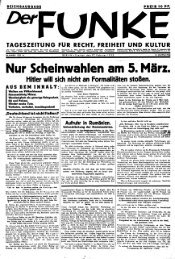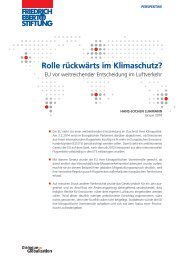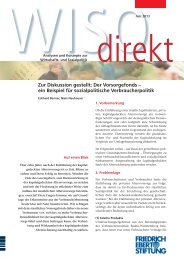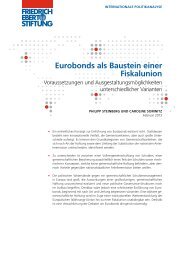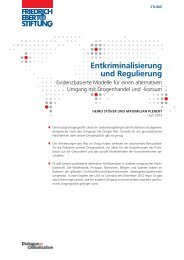Women - men - gender. - Bibliothek der Friedrich-Ebert-Stiftung
Women - men - gender. - Bibliothek der Friedrich-Ebert-Stiftung
Women - men - gender. - Bibliothek der Friedrich-Ebert-Stiftung
Create successful ePaper yourself
Turn your PDF publications into a flip-book with our unique Google optimized e-Paper software.
“A Conditioned Optimism”<br />
In conversation with Anke Fuchs, Chairperson of the <strong>Friedrich</strong> <strong>Ebert</strong> <strong>Stiftung</strong><br />
For the past 60 years, it is<br />
enshrined in the German Basic Law<br />
that, “Men and wo<strong>men</strong> are equal.”<br />
But is this, indeed, a reality in all<br />
fi elds today?<br />
I would like to take you back in<br />
time. You were a young lawyer,<br />
married and had two children. And<br />
you continued working full time.<br />
Was that diffi cult?<br />
Mothers, like yourself, were<br />
vilifi ed as callous and uncaring<br />
at the time?<br />
You not only had a full time job,<br />
you were also working in a purely<br />
man’s world in the executive of<br />
German metalworkers’ union,<br />
IG Metall?<br />
FRIEDRICH-EBERT-STIFTUNG<br />
WOMEN MEN GENDER<br />
On a daily basis, it has yet to become a reality. As a matter of fact, we<br />
have indeed achieved a lot at the socio-political level through the introduction<br />
of quotas, education and vocational training. But as far as<br />
everyday life is concerned, the struggle for equality at the work place<br />
and for reconciling family and job continues and is even today not an<br />
or ganized struggle.<br />
At the birth of my second child, my father-in-law wrote me a letter that<br />
now surely the job would have to take a back seat. And my mother gave<br />
my husband a dressing down, saying, “You’re obliging Anke to go to<br />
work.” However, both my husband and I were keen that I continue<br />
working. At the beginning, I spent more than half my salary on child<br />
care. The fact of the matter is, of course, that I certainly had an exciting<br />
job and a good salary. It would have been different altogether had I been<br />
working part-time somewhere.<br />
This brings to mind a small anecdote. Whenever we were invited to coffee,<br />
my children would wolf down enormous helpings of cake because<br />
they never got any at home. The reason being we never had the German<br />
traditional afternoon-tea-time at home. People then tut-tutted, saying<br />
children of working mothers were to be pitied.<br />
I learnt a lot during my stint with IG Metall but it was also a very diffi -<br />
cult time for me. In fact, it was so diffi cult, that I sometimes thought I<br />
would not be able to go through with it. You may well ask why? Well, I<br />
was just 30, married to a civil servant and had two children. On top of<br />
that, all the <strong>men</strong> over 50 were constantly won<strong>der</strong>ing what this young<br />
woman was doing there. They clearly felt that she should have been<br />
looking after her children. The goal of the workers’ move<strong>men</strong>t was obviously<br />
that the man should earn enough so that his wife could remain<br />
with the children. That was the time when we succeeded in eliminating<br />
‘light wage jobs’. Despite this, wo<strong>men</strong> did not want to stay at home.<br />
They wanted to earn their own money, even those wo<strong>men</strong>, who earned<br />
very little. The <strong>men</strong> found this attitude diffi cult to un<strong>der</strong>stand.<br />
3


